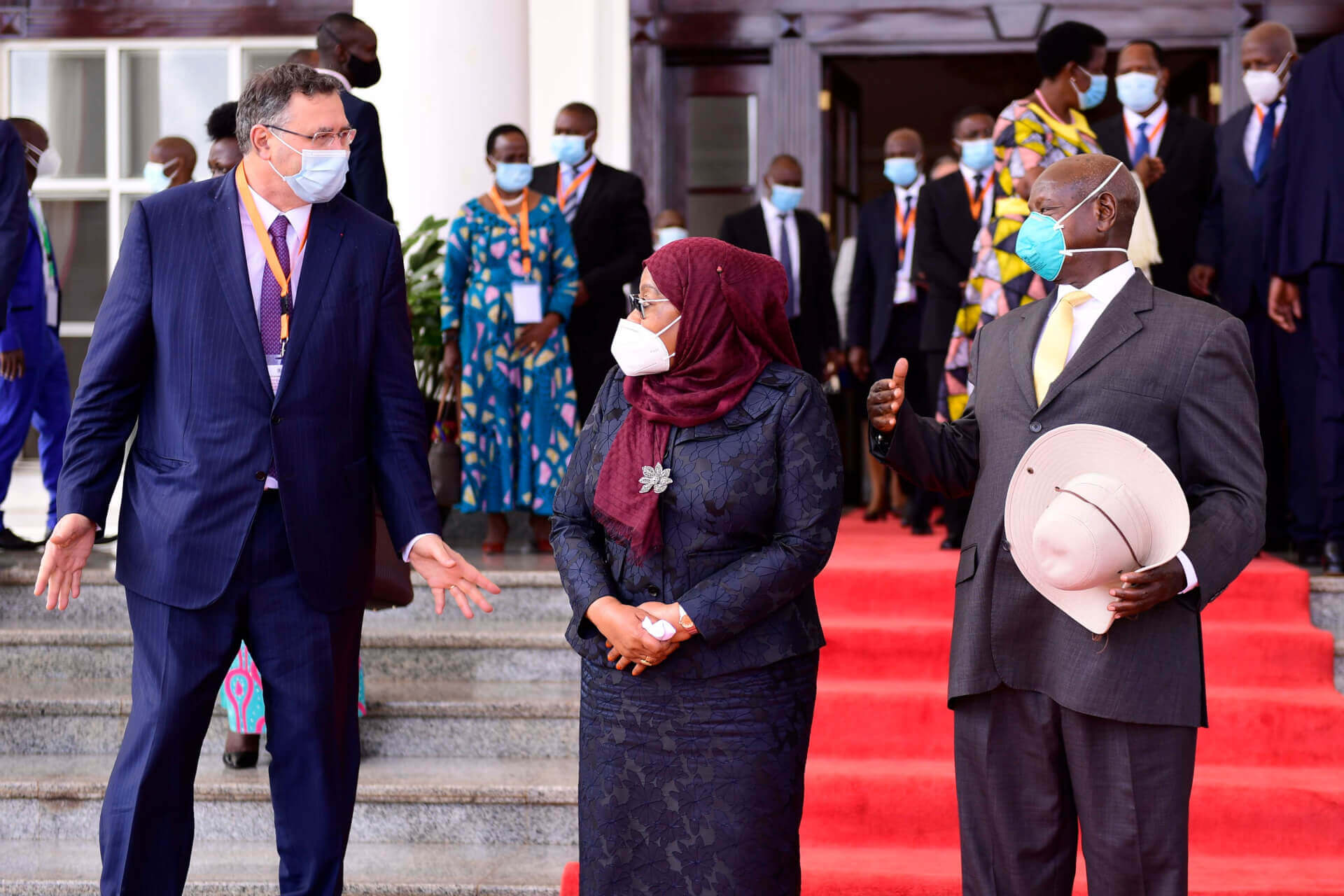On Sunday, Tanzanian President Samia Suluhu Hassan and her Ugandan counterpart Yoweri Museveni met in Uganda to sign a deal with international oil giants Total E&P and CNOOC for the $3.5 billion East African Crude Oil Pipeline (EACOP), which will connect the oil-rich Hoima region in Uganda with the Indian Ocean via Tanzania’s Tanga port. It is thought that the pipeline will be the world’s longest electrically heated crude oil pipeline. However, despite the tens of thousands of jobs the pipeline is expected to create, there are also concerns about environmental damage.
In fact, the two countries have been in protracted negotiations over the pipeline for years now and finally made headway in September last year, when erstwhile Tanzanian President John Magufuli and Museveni first inked an agreement to build the 1,445-kilometer-long crude oil pipeline project. The latest deal now incorporates French oil company total and Chinese oil company CNOOC, and outlines that production is expected to begin by 2025. The two companies purchased the Ugandan oilfields specified in the project from British oil and gas company Tullow Oil.
Following the signing of the deal, Ugandan President Museveni tweeted, “It has taken long before the first oil, due to divergent perceptions between us and the oil companies.” He said that he did not initially agree with exporting oil that east Africans need and pushed for an oil refinery. However, the oil companies were unwilling to budge and were only willing to be part of the deal if they could export the crude oil. Therefore, the two sides came to an agreement to build both a refinery and a pipeline, which will secure the energy needs of the region as well as the commercial interests of the oil companies.
In fact, the signing ceremony was attended by Total SA Chief Executive Patrick Pouyanné, who described the deal as a “momentous occasion in history” and the “beginning of a journey”. Also present at the meeting were Ugandan Energy Minister Goretti Kitutu and her Tanzanian counterpart Medard Kalemani.
Following the signing of the agreement, Ugandan Foreign Minister Sam Kuteesa announced, “The EACOP Tripartite Project Agreement has been signed by all parties with commitment for realization of the Equal project; for the benefit of all people of Uganda and Tanzania in the spirit of East Africa.”
Similarly, Ugandan President Museveni said, “I am […] most satisfied that the project will make a modest contribution to the development of Tanzania.” In fact, although the pipeline will extract resources from Uganda, roughly 80% of the pipeline is set to be in Tanzania, which former President Magufuli previous said would be a “crucial step” towards “creating jobs”, “promoting cooperation within the region”, and “stimulating economic development in areas the pipeline crosses”. It is thought that the pipeline could create 18,000 jobs.
Museveni added, “Moreover, this pipeline project might be the core of bigger developments if our brothers in Congo and South Sudan choose to use it for their oil, as the maximum it can carry is 230,000 barrels per day.”
Uganda first discovered a crude reserve in the Albertine rift basin, which lies to the west of the country, in 2006. The government hopes to use this deal as a launching board to build another pipeline to transport gas from Tanzania and Mozambique to Uganda, Rwanda, Congo, and other regional partners
However, environmental groups and activists have expressed concerns about the project’s impact on water resources, biodiversity, and local communities in Uganda, Tanzania, Kenya, and the Democratic Republic of Congo.
In March, a group of 263 non-governmental organisations (NGOs) came together to publish an open letter to the chief executives of 25 banks urging them not to finance the EACOP project, describing it as “manifestly irresponsible at a time when the catastrophic impacts of global warming are becoming increasingly clear”.
The letter posits: “According to the project’s website, the EACOP will carry 216,000 barrels of crude oil per day at ‘plateau production.’ The emissions from burning that oil would release an estimated 34.3 million metric tons of CO2 equivalent (CO2e) per year, an amount that dwarfs the current annual emissions of Uganda and Tanzania combined, and is roughly equivalent to the carbon footprint of nearly nine coal-fired power plants.”
Moreover, the project also draws into question Total’s commitment to becoming a net-zero emissions business by 2050.
However, Total SA CEO Pouyanné has said, “The Tilenga development and EACOP pipeline project are major projects for Total and are consistent with our strategy to focus on low breakeven oil projects while lowering the average carbon intensity of the Group’s upstream portfolio. These projects will create significant in-country value for both Uganda and Tanzania.” He added, “Total is also taking into the highest consideration the sensitive environmental context and social stakes of these onshore projects.”
Uganda and Tanzania’s Pipeline Deal With French and Chinese Oil Giants Draws Concern
A $3.5 billion deal signed between Uganda, Tanzania, and oil giants Total and CNOOC has ignited alarm and anger from environmentalists.
April 13, 2021

(L-R) Total SA CEO Patrick Pouyanné, Tanzanian President Samia Suluhu Hassan, and Ugandan President Yoweri Museveni in Kampala on Sunday SOURCE: OFFICE OF THE UGANDAN PRESIDENT
